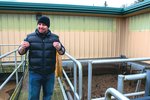
.jpg)
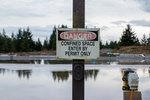
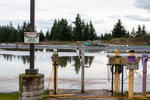
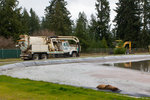
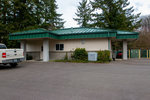
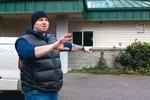
Within three years, Tenino Mayor Wayne Fournier wants to install a compost system at the Tenino Wastewater Treatment Plant that will turn human waste into fertilizer.
The product of the composting will be what are referred to as class A biosolids, the product of wastewater treatment processes that are treated to the point of containing no pathogens such as E. coli or salmonella.
In the last year, Tenino has contracted with several septage companies to have them bring in the solids they obtain from people’s septic tanks and pay to have them dumped into Tenino’s biosolids lagoon.
The lagoon, which is on the site of the wastewater treatment plant, is full of what are called class B biosolids, produced either by Tenino’s membrane batch reactors and a filtration process or from the solid product of someone’s septic tank.
Class B biosolids, which are regulated by the Washington state Department of Ecology, are treated to the point that they contain only about 1% of the pathogens that untreated human waste contains. Cities have to pay for a company to haul the class B biosolids from their treatment plants to then be spread on hay fields and the like in places such as Eastern Washington.
Recently, a Toledo citizen group, “Toledo Citizens Against Biosludge,” successfully convinced landowners near the city to not have class B biosolids spread on some agricultural land on the Layton Prairie.
Tenino wants to be able to stop paying for its class B biosolids to be hauled off, so it recently began the process of figuring out what else can be done with the waste.
“What we want to do in the future (is) we’ve got two different possible avenues,” Fournier told The Chronicle. “(We’re) trying to solve the problem of what we want to do with the human waste.”
After the city’s waste becomes class B biosolids, “the solids will sit in the lagoon, and then what do you do with them?” Fournier asked. “Eventually, you have to do something. Most places will just haul it off.”
He said the city wants to have a closed system, where everything is taken care of by the city’s own initiative.
“And our vision is to either have the solids go into a composting process, or we were working on a study of the biosolids going to a biodigester that would produce methane and then power the plant itself,” he said.
Fournier said the composting option is most likely and should be up and running in three years.
“If you take the biosolids from out of the lagoon, and you put them in some composting spaces, and you infiltrate oxygen and air into these piles and you add some carbon-based stuff — some leaves and things like that — it will further break down,” Fournier said. “It breaks itself down into a normal soil amendment. There’s some places that will just bag it and sell it. So I think there’s a treatment plant in Tacoma that bags it and sells the compost.”
He said this product — the class A biosolids — can be used in places where food is grown, and even went as far as saying that Tenino may offer these bags of fertilizer to the public free of charge before selling whatever isn’t used by residents.
He said the process of creating the class A biosolids is “pretty rudimentary” from his understanding.
“It’s like farm-style equipment,” he said. “You’ve got some big galvanized pipes that go in there. You’ve got an air compressor, and you put air into the piles, and you’ve got a front-end loader turning them over, and you’ve got some ecology blocks. It just takes time and heat and oxygen.”
The carbon-based matter used to break the biosolids down into their pathogen-free, class-A state could be done with the byproducts from marijuana manufacturers.
“At one point, I was looking into the marijuana industry,” Fournier said. “They have a lot of byproducts that are regulated in how you dispose of them. Something like that would be even perfect. I like the idea of that even more, because you've got the human waste and you’re throwing in the marijuana waste and you’re making something that is valuable to people.”
Fournier did address some of the push-back he and the city might receive regarding the creation of the fertilizer, saying that production of the class A biosolids is much preferable to paying for the class B biosolids to be hauled off and spread somewhere.
“We need to get over the ick factor,” he said. “We need to look at it scientifically. These are chemicals. There’s nutrients in the chemicals.”
He said fertilizer prices are through the roof.
“We need to get used to using human waste as fertilizer,” Fournier said. “It needs to be done safely and we need to just accept that. There’s one thing that all our cities produce. They’re sh-t factories. We need to be able to turn that liability into an asset.”